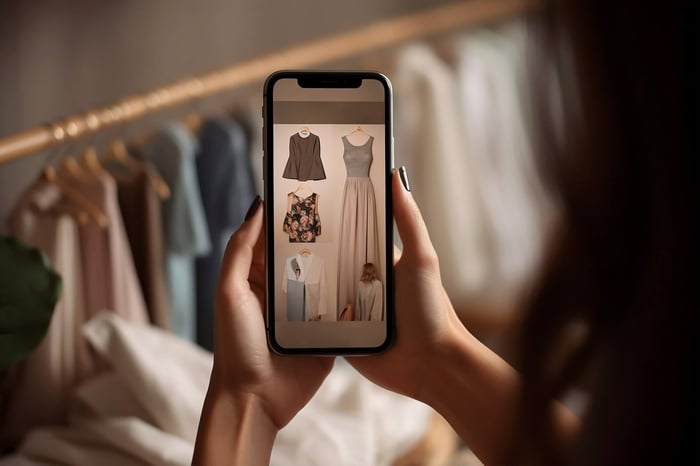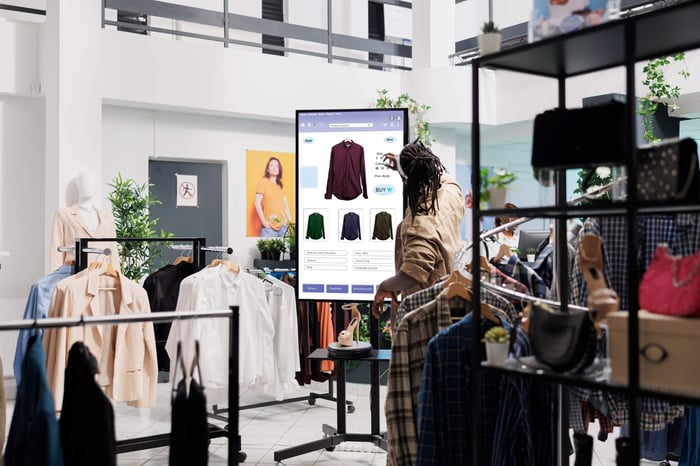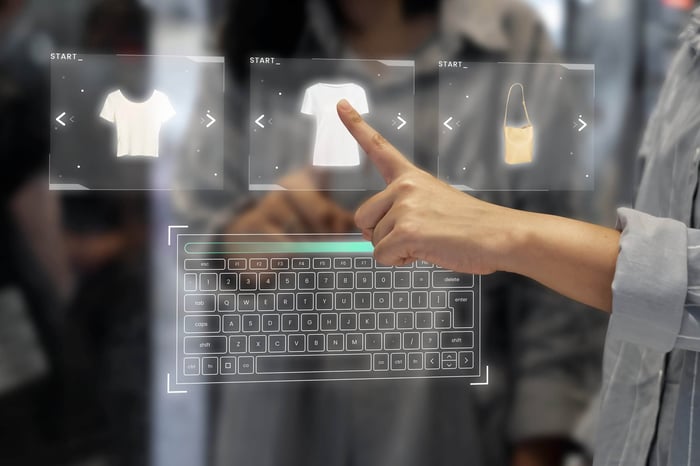Exploring the Future of Virtual Clothing Stores
Table of Contents
- What Is a Virtual Clothing Store?
- Why Virtual Clothing Stores Are Changing Fashion
- How 3D Fashion Shopping Works
- The Role of AI and Modelia in Digital Fashion
- The Emotional Side of Virtual Shopping
- Benefits of Virtual Clothing Stores
- Future Trends in Digital Clothing Shops
- Conclusion: The Next Step in Fashion Retail
- FAQs About Virtual Clothing Stores
Online shopping has already transformed fashion, e-commerce where a total revolution, specially since Covid-19, but the next wave of innovation is here: the virtual clothing store. With the improvements in 3D experiences and artificial intelligence, this is so close to be a reality. Imagine stepping into a digital boutique where you can browse collections, try on outfits in 3D and see how fabrics move and fit all without leaving your home.
What used to be a static scrolling experience is evolving into something immersive, interactive and deeply personalized. From 3D fashion shopping to digital showrooms powered by AI, the virtual clothing store is redefining how consumers connect with brands.

What Is a Virtual Clothing Store?
A virtual clothing store is a digital shopping space where customers can explore apparel collections in a 3D or augmented reality environment. Unlike traditional online fashion online stores, these platforms allow users to interact with garments, zoom in, rotate and even visualize pieces on lifelike avatars generated with AI or on themselves.
These experiences are powered by advanced visualization technologies that simulate real-world materials, textures and lighting. The result is a more natural and engaging way to shop fashion online.

The Technology Behind It
3D modeling and rendering bring products to life with realistic movement.
AI and body scanning create personalized avatars to improve fit accuracy.
Virtual try-on features allow customers to experiment with styles before buying.
Immersive store layouts mimic the flow and atmosphere of a physical boutique.
Why Virtual Clothing Stores Are Changing Fashion
- Immersive Shopping Experiences
Consumers crave more than convenience, they want connection. A virtual clothing store allows shoppers to interact with garments in ways impossible through standard e-commerce photos. You can move through a digital environment, mix and match looks, and see how clothes behave in motion.
- Sustainability and Efficiency
Virtual showrooms reduce the need for physical samples, cutting waste and energy costs. For brands, it’s a smarter way to present collections, and for consumers, it’s a greener way to shop.
- Global Accessibility
A digital clothing shop is always open. Shoppers from around the world can access the same experience simultaneously, breaking geographical barriers and making fashion more inclusive than ever.

How 3D Fashion Shopping Works
3D fashion shopping uses technology to simulate the experience of being in a physical store. Here’s what makes it so revolutionary:
3D garment visualization: Designers create detailed 3D models of clothing items that replicate real fabrics, cuts, and textures.
Avatar customization: Shoppers can adjust avatars to match their body shape, height, and skin tone for more accurate fit previews.
Virtual fitting rooms: With AR and AI, users can “try on” garments in real time using their webcam or smartphone camera.
Real-time feedback: Some platforms use AI to recommend styles or sizes based on the shopper’s preferences and previous selections.
This combination of virtual clothing store design and intelligent data analysis makes the shopping journey more personal, visual, and enjoyable.
The Role of AI and Modelia in Digital Fashion
AI is at the core of today’s most advanced digital clothing shops. Tools like Modelia allow brands to instantly generate photorealistic models wearing any outfit, in any setting, with just a few clicks.
Fashion brands can now:
Create full 3D lookbooks without physical photo shoots.
Display items on diverse AI-generated models for inclusive representation.
Produce marketing visuals that look authentic, dynamic, and on-brand.
Modelia’s technology bridges the gap between physical and online fashion stores, offering scalable content creation and realistic visual experiences that enhance consumer engagement.
By combining automation with artistry, Modelia helps brands prepare for the new era of 3D fashion shopping, where visuals and experience are just as important as the product itself.

The Emotional Side of Virtual Shopping
Beyond Screens: A New Kind of Connection
For many consumers, shopping has always been about emotion. A virtual clothing store brings that feeling back to digital retail. Instead of clicking through flat images, shoppers can “walk” through a space, discover collections, and feel immersed in a brand’s world.
Self-Expression in a Digital Age
Virtual fashion allows individuals to experiment without limits. You can try bold colors, avant-garde silhouettes, or futuristic materials, all virtually. This kind of freedom builds stronger emotional bonds between shoppers and the brands they love.
Benefits of Virtual Clothing Stores
Advantage | Description |
|---|---|
Realism | Experience clothing in lifelike 3D with true-to-texture visuals |
Convenience | Shop from anywhere, anytime |
Personalization | AI-driven recommendations and avatar-based fittings |
Sustainability | Reduces waste from samples and returns |
Engagement | Immersive environments that boost customer interaction |
Conversion | More informed purchases lead to fewer returns |
Each of these benefits adds measurable value for both consumers and retailers. As technology improves, virtual clothing stores will likely become the standard for digital fashion retail.
Future Trends in Digital Clothing Shops
The evolution of digital clothing shops doesn’t stop at virtual try-ons. Expect to see:
Fully interactive 3D runways where viewers can click to purchase items in real time.
AI stylists that curate personalized wardrobes for each shopper.
Metaverse shopping environments blending entertainment, gaming, and fashion.
Integration with NFTs and digital wardrobes for hybrid physical-virtual ownership.
These innovations will continue blurring the line between online and offline retail, creating a seamless ecosystem of digital fashion experiences.

Conclusion: The Next Step in Fashion Retail
The virtual clothing store is no longer a futuristic concept, it’s today’s reality. As shoppers seek more immersive, creative, and sustainable ways to buy fashion, 3D experiences are leading the transformation.
Tools like Modelia empower brands to meet this demand with lifelike visuals, customizable avatars, and digital models that make every collection shine. Whether you call it 3D fashion shopping, digital clothing shops, or simply the next generation of the online fashion store, the goal is the same, to make fashion more inspiring, interactive, and accessible to everyone.
The future of fashion isn’t just digital, it’s beautifully human, powered by technology that understands emotion, individuality, and style.
FAQs About Virtual Clothing Stores
1. What is a virtual clothing store?
A virtual clothing store is an online fashion store that uses 3D and AI technology to create an immersive shopping experience. Instead of browsing flat photos, you can explore digital clothing shops where garments move and look realistic. Some even allow you to try on clothes virtually using avatars or augmented reality.
2. How does 3D fashion shopping work?
3D fashion shopping works by turning clothing designs into detailed digital models. These 3D garments simulate textures, fabrics, and movement, allowing shoppers to rotate, zoom, and see how clothes fit. Many digital clothing shops also let you customize an avatar to match your body type for a more accurate virtual fitting.
3. Are virtual clothing stores reliable for online shopping?
Yes. The technology behind virtual clothing stores has evolved to make online fashion shopping more precise and interactive. With tools like Modelia, brands can display garments in photorealistic detail, helping shoppers make more confident purchasing decisions. This reduces returns and improves satisfaction compared to traditional e-commerce.
4. What are the benefits of shopping in a virtual clothing store?
Shopping in a virtual clothing store offers realism, convenience, and sustainability. You can experience clothing in lifelike 3D, try on pieces virtually, and discover new collections from anywhere in the world. It’s a more personal, eco-friendly way to engage with online fashion stores and enjoy the future of 3D fashion shopping.
How would you rate this article:
Related Articles
- Master Flat Lay Styling Techniques for Perfect Arrangements
- Old School Fashion Trends That Are Back in Style
- How to Stay Stylish on a Budget: Fashion Shopping Tips for the Savvy Shopper
- Best Free AI Image Generators You Can Use in 2026
- Autumn Fashion Trends 2025: Key Styles & Outfit Ideas
- 10 Best Fashion e-Commerce Sites to Watch in 2025
- Top 10 Fashion Ecommerce Solutions: Optimize Your Online Fashion Store
- Virtual Try-On Technology in Fashion: The Future of Online Shopping
- 6 Best AI Image Upscaling Software to Boost Image Quality
- How to Flip an Image in Seconds


